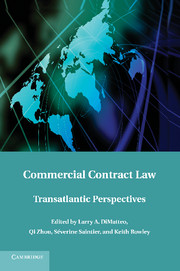Book contents
- Commercial Contract Law
- Commercial Contract Law
- Copyright page
- Dedication
- Brief Contents
- Contents
- Contributors
- Foreword
- Part I The Role of Consent
- Part II Normative Views of Contract
- Part III Contract Design and Good Faith
- Part IV Implied Terms and Interpretation
- Part V Policing Contracting Behavior
- Part VI Misrepresentation, Breach, and Remedies
- Part VII Harmonizing Contract Law
- Index
Part II - Normative Views of Contract
Published online by Cambridge University Press: 05 February 2013
- Commercial Contract Law
- Commercial Contract Law
- Copyright page
- Dedication
- Brief Contents
- Contents
- Contributors
- Foreword
- Part I The Role of Consent
- Part II Normative Views of Contract
- Part III Contract Design and Good Faith
- Part IV Implied Terms and Interpretation
- Part V Policing Contracting Behavior
- Part VI Misrepresentation, Breach, and Remedies
- Part VII Harmonizing Contract Law
- Index
Summary
The theoretical bases of contract generally are dependent on either deontological or consequentialist normative commitments, or some combination of the two. Contract doctrine should instantiate (or at least not frustrate) the operation of the normative calculus. The chapter assesses whether contract doctrine is deficient in forwarding such normative commitments. At the least, the normative inquiry is opaque as it relates to contract doctrine. The chapter describes the normative impotence of contract by focusing on the two foundations of consensual liability: allocation of risk and formation of agreement. The material on mistake, impracticability, and the modification of contract doctrine depicts how risks are allocated. The chapter draws from the most recent United States Supreme Court arbitration decisions to illustrate the failure of the agreement principle.
The chapter suggests that contract law doctrine can only make sense if we take account of the fundamental bases of the normative considerations we actually bring to the resolution of a contract controversy. Those bases are best revealed in recent neuroethical and evolutionary inquiries into the constitution of the human agent’s normative commitments.
Finally, the chapter describes the apposite contract doctrine and surveys, summarily, the commentary that reveals the normative quandaries. It engages primarily apposite consequentialist theory but also suggests the limits of a deontological perspective that is subject to the same deficiencies as utilitarian analyses. From those premises apposite neuroscience findings are considered to see what, if anything, a more sophisticated sense of human agency can do to refine either the formation or application of doctrine. Ultimately, the chapter concludes that contract doctrine fails, at least in crucial ways and at crucial junctures, in relation to the preceding normative commitments.
- Type
- Chapter
- Information
- Commercial Contract LawTransatlantic Perspectives, pp. 83 - 178Publisher: Cambridge University PressPrint publication year: 2013

